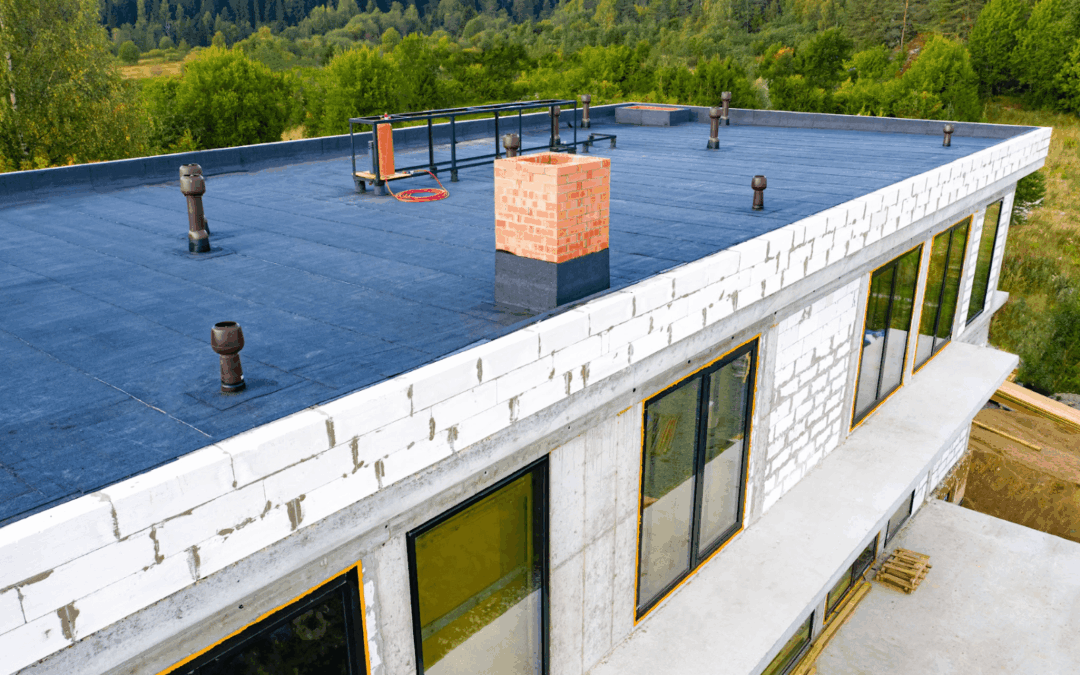Flat roofs aren’t just for commercial buildings anymore. In Colorado’s mountain towns and urban neighborhoods alike, modern flat and low-slope residential roofs are growing in popularity. Their clean lines, efficient use of space, and compatibility with solar systems make them a favorite among architects and homeowners seeking a sleek, contemporary look.
But if you’re thinking about installing a flat roof, or already have one, you’re probably asking: How long does a flat roof last on a home in Colorado? The answer depends on several factors: the type of material used, the quality of installation, how well the roof is maintained, and, most importantly, how it holds up to Colorado’s challenging climate.
Let’s explore the typical lifespan of various flat roofing systems for residential use, what affects their durability, and how to get the most out of your investment.
What Is Considered a Flat Roof on a Home?
Before we dive into lifespan, let’s clarify what counts as a “flat” roof. In residential roofing, flat or low-slope roofs typically have a pitch of 2:12 or less. While they appear flat, they’re designed with a slight angle to allow for drainage.
These types of roofs are common on:
- Mountain cabins with a modern design
- Urban townhomes or accessory dwelling units (ADUs)
- Mid-century or contemporary-style homes
- Remodels and rooftop patios
Unlike pitched roofs with shingles, flat roofs rely on a waterproof membrane to protect the home. How that membrane is cared for plays a big role in how long your roof will last.
Average Lifespan of Flat Roof Materials
There are several types of flat roofing systems available to homeowners in Colorado. Each one comes with its own pros, cons, and life expectancy.
1. EPDM (Rubber Roofing)
Lifespan: 20–30 years
EPDM (ethylene propylene diene monomer) is a flexible, rubber-based membrane that performs well in both hot and cold climates. It’s resistant to UV rays, snow, and freeze-thaw cycles, making it a solid option for homes in Winter Park and other high-altitude towns.
When installed professionally and maintained regularly, EPDM can easily reach the 25-year mark. Seam quality and proper drainage are critical to avoid premature failure.
2. TPO (Thermoplastic Polyolefin)
Lifespan: 15–25 years
TPO is another single-ply membrane that’s gaining popularity in residential builds. It’s more reflective than EPDM and offers energy-efficient benefits, especially in sunny locations like Colorado’s Front Range and mountain valleys.
TPO holds up well to UV exposure and microbial growth, but it can be more vulnerable to punctures from foot traffic or hail if not properly reinforced.
3. PVC (Polyvinyl Chloride)
Lifespan: 20–30 years
PVC roofing is known for its chemical resistance and excellent seam strength. While more common on commercial buildings, it’s occasionally used in residential flat roofs where performance is a top priority.
PVC offers excellent durability in high-snow regions, but it comes at a higher material cost. If installed correctly, it can outlast many other options.
4. Modified Bitumen
Lifespan: 15–25 years
Modified bitumen is a multi-layer roofing system made from asphalt and reinforced fabrics. It’s one of the oldest flat roofing options and still performs well in Colorado’s variable climate.
Because it’s applied in sheets and heat-sealed, it’s essential to hire a qualified roofer. Poor installation can lead to weak spots, but when done right, it’s a solid long-term performer.
5. Flat Metal Roofing (Standing Seam)
Lifespan: 40+ years
Though less common in residential flat roofs, flat or low-slope metal roofing is a premium option for Colorado homeowners seeking unmatched longevity. Standing seam panels made of steel or aluminum can resist snow load, hail, and wind better than almost any other material.
With proper insulation and drainage design, a flat metal roof can last 40 years or more, making it a smart investment for long-term property owners.
Factors That Affect Roof Longevity in Colorado
Even with a long-lasting material, Colorado’s climate can shorten or extend the life of your flat roof depending on a few key variables:
1. Snow Load and Freeze-Thaw Cycles
Homes in Fraser, Winter Park, and Grand Lake experience heavy snowfall and frequent temperature swings. Flat roofs must be designed to withstand both the weight of snow and the expansion of freezing water.
Ponding water or ice dams can speed up membrane degradation, especially if your roof isn’t properly draining.
2. UV Exposure
At higher elevations, UV rays are more intense. This can break down some roofing materials faster if they’re not UV-resistant. Reflective membranes like TPO or coatings can help reduce heat absorption and extend membrane life.
3. Installation Quality
Even the best materials won’t perform if improperly installed. Seams that aren’t sealed correctly or flashing that’s not watertight can allow water infiltration and compromise the entire system.
Always hire a licensed, experienced roofing company, like Integrity Pro Roofing, that understands the demands of high-altitude residential roofing.
4. Routine Maintenance
Just like your car or HVAC system, your flat roof needs regular checkups. Catching issues early, like minor membrane punctures or blocked drains, can extend your roof’s lifespan by years.
We recommend a biannual inspection, especially before and after winter.
Signs Your Flat Roof May Be Nearing the End
Not sure how old your current roof is? These signs could mean it’s time to start planning for replacement:
- Bubbling or blistering on the roof surface
- Pooling water that doesn’t drain after 48 hours
- Cracks, splits, or open seams
- Frequent leaks inside the home
- Interior stains or mildew smell
- Uneven or soft roof decking underfoot
How to Extend the Life of Your Flat Roof
Here’s what Colorado homeowners can do to protect their flat roof investment:
- Schedule regular inspections – Catch issues before they spread
- Clean drains and gutters – Prevent ponding and water backup
- Remove debris and snow buildup – Excess weight and moisture = damage
- Invest in a protective roof coating – Add reflectivity and waterproofing
- Choose the right materials from the start – Not all flat roofing is equal
Choose Longevity, Choose Experience
Flat roofs on Colorado homes can absolutely stand the test of time, but only with the right materials, the right installation, and the right maintenance strategy.
At Integrity Pro Roofing, we help homeowners make informed decisions based on local conditions, budget, and design goals. Whether you’re building a modern mountain home or maintaining an existing flat roof in the Colorado Rockies, we’re here to help you protect what matters. Schedule a complimentary roof inspection today and get expert recommendations on how to keep your home secure through every season.






